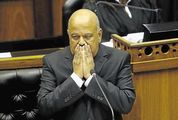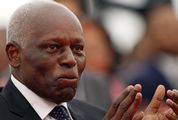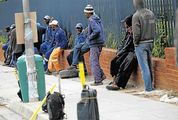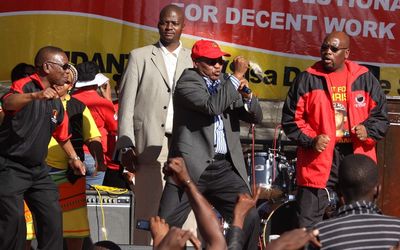THE crucial debate over the legislated national minimum wage has been dominated by much fear-mongering, untruths, and outright propaganda to mislead people, because big business remains totally opposed to it. Big business has exposed its lack of developmental consciousness by throwing every obstacle in the path of a minimum wage deal, despite a rapid increase in inequality and deepening poverty levels in the country.
The issue is being treated as if it is a revolutionary advance towards a socialist setting, when we all know that even the most ardent capitalist countries have implemented it as part of their economic recovery. In the UK, minimum wages were introduced at the beginning of the 20th century, abolished in the 1980s and reinstated in the 1990s.
In the US, a higher minimum wage has come to be seen by many as a response to reducing poverty and inequality, and to provide a stimulus to the economy with potentially favourable economic effects including the reduced costs of antipoverty programmes and increased tax revenue.
LATIN American countries have used minimum wages during economic crises to boost domestic demand — and it not only supported consumption, but also boosted investment and growth. There is evidence minimum wages also helped create a middle class, creating room for autonomous growth, and enhancing social cohesion.
More than 21 years after our democratic breakthrough and 60 years after the adoption of the Freedom Charter, millions of South African workers remain super-exploited, stuck in the cheap labour system as a part of the working poor.
Despite working full-time, a growing layer of workers still cannot afford basic necessities. They are struggling to pay rent and take care of their families.
While it is indisputable that we inherited a legacy of an apartheid wage structure that was never attended to and an economic structure that is untransformed; research institutes, economists and social commentators continue to produce voluminous work, arguing against the national minimum wage.
These opinion makers do not talk to the fact that SA’s economic system is not fully transformed and still has features of colonialism of a special type.
American and French political and social scientist Susan George says neo-liberalism triumphs despite its economic, political, social and ecological disasters because neoliberals pay for their agenda. "The neoliberals and their funders have created a huge international network of foundations, institutes, research centres, publications, scholars, writers and public relations hacks to develop, package and push their ideas and doctrine relentlessly," George warns.
In the South African context, there is no coherent argument against the need for a national minimum wage as part of a package of measures aimed at tackling wage inequality and working poverty.
The African National Congress’s 2014 election manifesto proposed comprehensive collective bargaining, state incentives, employment equity, and the national minimum wage as a package of mechanisms to transform the apartheid wage structure to promote decent wages and decent work.
A FEW vocal individuals have argued that a legislated national minimum wage will be bad for employers. But studies have shown that adopting a minimum wage and paying workers better salaries make businesses operate more efficiently and employees more productive. Decent wages lead to more content employees, who stay longer with the business, reducing staff turnover and training costs associated with hiring new employees.
Some have argued vehemently that a minimum wage will cost the economy jobs and raise the level of unemployment. It is not supported by hard evidence.
In the US, a study by banking giant Goldman Sachs of the 13 states that raised their minimum wages found that "the states where the minimum wage went up had faster employment growth than the states where the minimum wage remained at its 2013 level".
In SA, labour, in alliance with communities, has placed detailed proposals on the table based on extensive analyses of international experience, and detailed consideration of the South African wage structure and the conditions facing workers.
It was contemptible to see the Treasury presenting a biased research paper suggesting a national minimum wage set at the ridiculously low level of R1,258 a month would cause substantial job losses.
This is disproved by research by the Wits National Minimum Wage Research Initiative that shows a wage of R3,500-R6,000 could be introduced without major negative effects, and would have many positive effects on the economy.
...
THE national minimum wage should make an effective contribution to a wage policy that tackles the obscene levels of wage inequality still prevalent in SA’s wage structure. It must afford all workers a basic level of dignity. In its design and legislative formulation, it must support and reinforce collective bargaining and the setting of sectoral wages at a level higher than the national minimum wage floor. It must counter potential abuse by employers, and legislate against the downward variation of existing agreements that are higher than the national minimum wage.
The International Labour Organisation is very clear that the objective of the minimum wage is to reduce poverty by establishing a generally applicable lower limit under which wages are not permitted to fall. The fixing of such a general minimum wage, normally is associated with the view that all workers, as a matter of right, ought to receive protection against unacceptably low wages. Workers in this country have waited long enough for the national minimum wage and the captains of business should understand that their unacceptable conduct of refusing to discuss its levels will be strongly opposed.
It is reassuring that the government’s leadership is starting to become vocal and unambiguous on this need. Recently, Deputy President Cyril Ramaphosa told MPs the national minimum wage could go far to provide an injection into the economy. He also made it clear the government fully supported the introduction of a national minimum wage.
It has been 22 years since our democratic breakthrough, yet we have not managed to break or make a sufficient dent in the apartheid wage gap. A decent living national minimum wage will help to achieve that.
It has been shown to help reduce inequality and poverty in a meaningful way in Brazil, a country with similar socio-economic challenges to SA. Business would do well to look at the progressive example set by former PPC CEO Ketso Gordhan, who reduced the salaries of management, increased workers’ salaries, and significantly reduced the company’s wage gap.
BIG business should understand that engagement on the national minimum wage cannot be endless. As an important stakeholder and social partner, the grouping needs to appreciate the necessity to commit to a tight deadline for the finalisation of these negotiations. The Congress of South African Trade Unions’ (Cosatu’s) position is clear that business needs to accept that the national minimum wage will go ahead, with or without their co-operation. Continued delays will force labour to take mass action to break the log jam and their obstructionism and resistance will crumble under mass mobilisation.
The Freedom Charter called for a national minimum wage as one of its major demands 60 years ago. It stated that there shall be a 40-hour working week, national minimum wage, paid annual leave, sick leave for all workers, and maternity leave on full pay for all working mothers.
To cash that cheque that was signed for them during the adoption of the Freedom Charter, the workers will not ask any favours or expect any benevolence from anyone, but they are ready to launch a process of intensive mobilisation to demand what is due to them.
• Dlamini is president of Cosatu
























Change: 0.40%
Change: 0.47%
Change: -0.49%
Change: 0.53%
Change: 1.03%
Data supplied by Profile Data
Change: 1.71%
Change: 1.28%
Change: 0.40%
Change: 0.00%
Change: 1.64%
Data supplied by Profile Data
Change: -1.27%
Change: 0.00%
Change: 0.05%
Change: -0.08%
Change: 0.35%
Data supplied by Profile Data
Change: -0.02%
Change: 0.21%
Change: -0.06%
Change: 0.53%
Change: 0.70%
Data supplied by Profile Data